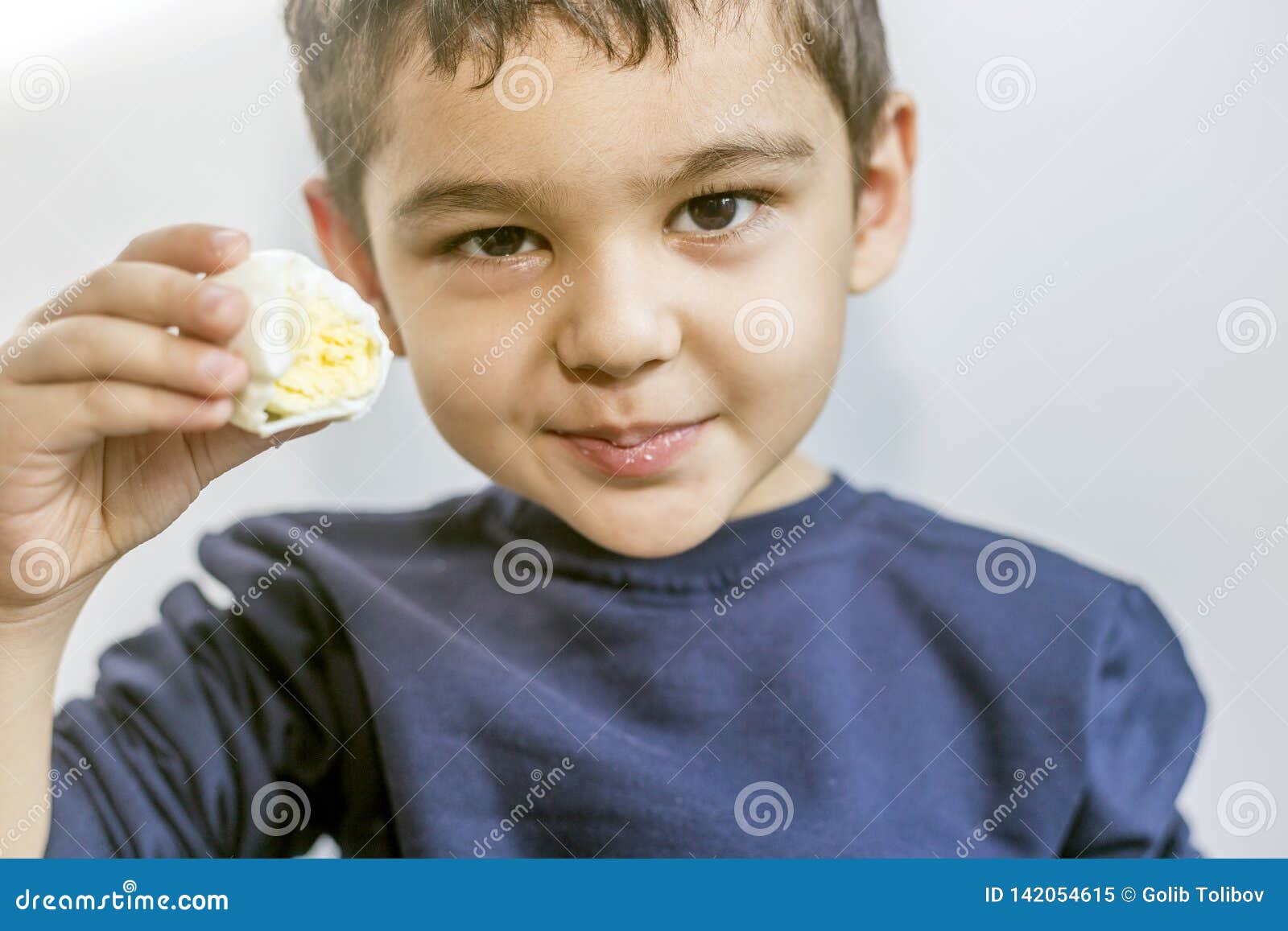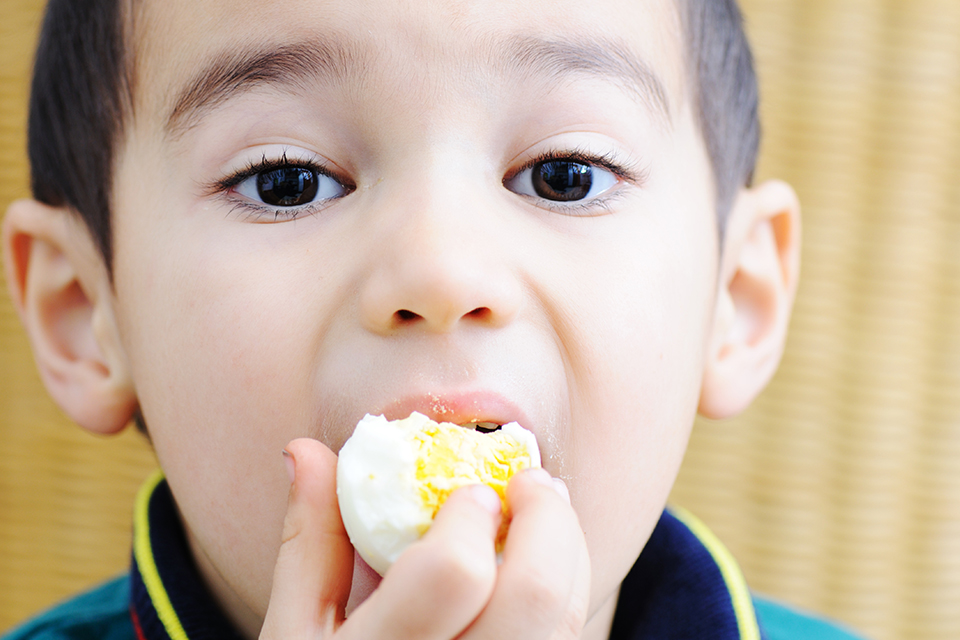
When Can a Baby Eat Eggs? Risks, and More
1 How to Cook Eggs 2 Your toddler won't eat? Help is here! 3 Nutrition in Eggs 4 How to Cook Eggs for Baby 5 At what age can I serve scrambled eggs to my baby? 6 Eggs as Finger Food 7 How to Cook Scrambled Eggs in the Microwave 8 How to Cook Scrambled Eggs on the Stove Top 9 How to Cook Eggs for Toddlers 10 How to Make Hard-Cooked Eggs

Toddler eating eggs YouTube
1. Complete protein Save Image: IStock Eggs are a complete protein food. Each egg contains 6 grams of protein per serving. Proteins are the building blocks for a young body and are required for new cell generation and regeneration of cells. Eggs help kids grow bigger and stronger.

Child eating boiled egg stock image. Image of eggs, fresh 142054615
The American Academy of Pediatrics says that for most children, you do not need to give foods in a certain order. Your child can begin eating solid foods at about 6 months old. By the time he or she is 7 or 8 months old, your child can eat a variety of foods from different food groups. These foods include infant cereals, meat or other proteins.

Five reasons eggs are perfect food for kids
Eggs are a nutrient powerhouse with essential vitamins and minerals, along with high-quality protein making them a good choice for your infants, toddlers, and for sure, any picky eaters. Five reasons why kids should eat eggs: Early potential allergen introduction can help reduce the risk of developing an egg allergy.

When Can You Give A Baby Eggs Factory Sale, Save 46 jlcatj.gob.mx
1. Healthy brain Research has found that pregnant and breastfeeding women who eat eggs are more likely to meet their child's need for choline. 1 What is choline, you ask? It boosts parts of the brain important for learning and memory.

Child's Weight Concern You? Foods to Help Your Child Gain Weight Safely
How to Help Your Child Learn to Like Eggs — Veggies & Virtue LOOKING FOR EASY WAYS TO ADD VEGGIES TO YOUR CHILD'S LUNCH? I GOT YOU! CLICK HERE >>>

young boy with large pile of easter eggs eating egg Stock Photo Alamy
Eggs are amazing for health! They contain 6 grams of high-quality protein. They are rich in choline-an essential vitamin-like nutrient that helps develop the brain and enhance memory. They are gluten-free and contain all 9 essential amino acids. Eggs are rich in vitamin B-12, the vitamin that provides energy; protects the brain, and improves.

Child is Eating Chocolate Eggs Stock Photo Image of cheerful, hand
The Ultimate Guide to Eggs for Babies & Toddlers Eggs are my fav food. I can eat them for every meal of the day, every day, and I do - and still haven't gotten sick of them yet! There's a running joke about it between me and my mom - how if we could only eat one food for the rest of our lives, eggs would be it!

Easter egg hunting. A group of children eating chocolate eggs Stock
Are eggs good for kids? Yes. Eggs have many nutritional benefits for kids and toddlers. They are an amazing source of protein and vitamin D, both which benefit children's growing bodies. A "complete protein," eggs contain all nine amino acids that our bodies do not produce. Protein is important because it acts as the body's building blocks.
/200571387-004-56a6fd2d3df78cf772914d09.jpg)
How Many Eggs Can Your Child Eat Each Day?
Eating eggs doesn't need to be boring. There are tons of ways to creatively incorporate eggs into your diet. Despite what rumours may lead you to believe, eggs are actually one of the most nutritious foods in the world—some sources even say they can help with weight loss (despite Gaston's claim that it made him large).
/GettyImages-585356831-f22e0043c17c4b3a8d632c77bf63a04d.jpg)
How Many Eggs Can Kids Eat Each Day?
One of the most popular claims is eating them frequently causes elevated blood cholesterol. However, recent research has busted this claim - eating an egg daily is not directly responsible for this. One egg contains approximately 185mg of cholesterol. A healthy child's daily cholesterol intake should be under 300mg a day.

Parenting News Kids who Aren't Allowed Easter Eggs Risk LongTerm
The recommended intake for children is: 150 mg daily from 7 months to 1 year 200 mg daily from 1 to 3 years 250 mg daily from 4 to 8 years 375 mg daily from 9 to 13 years 550 mg daily from 14 to 18 years So, one to two eggs daily will meet the requirement for younger children.

Pin on Gluten Free EASY
What kind of eggs are best for toddlers? I would suggest choosing pasture-raised eggs if you can. They are higher in some vitamins and omega-3s, and lower in saturated fat. Win-win! How many eggs can toddlers eat? The official scientific recommendation says to serve up to 7 eggs per week.
Breakfast Perfection Eggs
Is it healthy to eat eggs every day? Topics in this Post Nutrition Get healthy recipes and tips Eggs have been in the news a lot — again. It seems like every few years, questions arise about these meals in a shell. Are they good or bad for you? What about their protein and cholesterol?

Is it Okay for a Toddler to Eat Eggs Every Day? What The Experts Say
Eggs provide a wealth of nutrients children need for healthy growth and development. One large egg provides 6.25 grams of protein, which is between 18 and 48 percent of the RDA for protein for children ages 1 to 13 years old. One large egg also provides 60 to 128 percent of the RDA for vitamin A and 18 to 23 percent of the RDA for vitamin B-12.
Hello World! Eating Boiled Eggs
The best eating pattern for a child's growth and development considers the child's age, activity level and other characteristics.. Choose seafood, lean meat and poultry, eggs, beans, peas, soy products, and unsalted nuts and seeds. Fruits. Encourage your child to eat a variety of fresh, canned, frozen or dried fruits. Look for canned fruit.